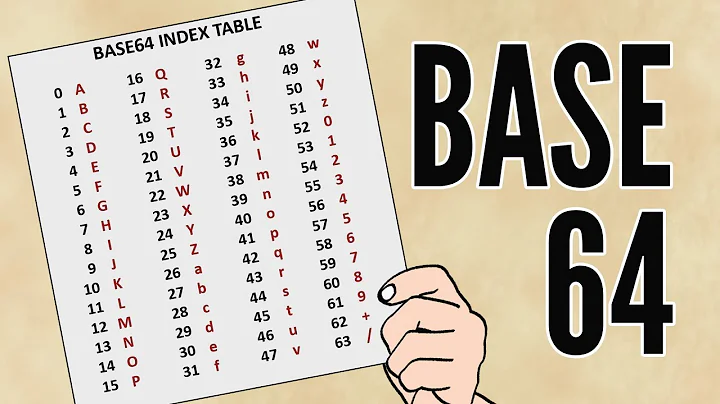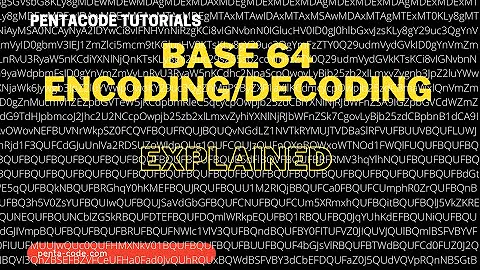How to base64 encode /dev/random or /dev/urandom?
Solution 1
What about something like
cat /dev/urandom | base64
Which gives (lots of) stuff like
hX6VYoTG6n+suzKhPl35rI+Bsef8FwVKDYlzEJ2i5HLKa38SLLrE9bW9jViSR1PJGsDmNOEgWu+6
HdYm9SsRDcvDlZAdMXAiHBmq6BZXnj0w87YbdMnB0e2fyUY6ZkiHw+A0oNWCnJLME9/6vJUGsnPL
TEw4YI0fX5ZUvItt0skSSmI5EhaZn09gWEBKRjXVoGCOWVlXbOURkOcbemhsF1pGsRE2WKiOSvsr
Xj/5swkAA5csea1TW5mQ1qe7GBls6QBYapkxEMmJxXvatxFWjHVT3lKV0YVR3SI2CxOBePUgWxiL
ZkQccl+PGBWmkD7vW62bu1Lkp8edf7R/E653pi+e4WjLkN2wKl1uBbRroFsT71NzNBalvR/ZkFaa
2I04koI49ijYuqNojN5PoutNAVijyJDA9xMn1Z5UTdUB7LNerWiU64fUl+cgCC1g+nU2IOH7MEbv
gT0Mr5V+XAeLJUJSkFmxqg75U+mnUkpFF2dJiWivjvnuFO+khdjbVYNMD11n4fCQvN9AywzH23uo
03iOY1uv27ENeBfieFxiRwFfEkPDgTyIL3W6zgL0MEvxetk5kc0EJTlhvin7PwD/BtosN2dlfPvw
cjTKbdf43fru+WnFknH4cQq1LzN/foZqp+4FmoLjCvda21+Ckediz5mOhl0Gzuof8AuDFvReF5OU
Or, without the (useless) cat+pipe :
base64 /dev/urandom
(Same kind of output ^^ )
EDIT : you can also user the --wrap option of base64, to avoid having "short lines" :
base64 --wrap=0 /dev/urandom
This will remove wrapping, and you'll get "full-screen" display ^^
Solution 2
A number of folks have suggested catting and piping through base64 or uuencode. One issue with this is that you can't control how much data to read (it will continue forever, or until you hit ctrl+c). Another possibility is to use the dd command, which will let you specify how much data to read before exiting. For example, to read 1kb:
dd if=/dev/urandom bs=1k count=1 2>/dev/null | base64
Another option is to pipe to the strings command which may give more variety in its output (non-printable characters are discarded, any runs of least 4 printable characters [by default] are displayed). The problem with strings is that it displays each "run" on its own line.
dd if=/dev/urandom bs=1k count=1 2>/dev/null | strings
(of course you can replace the entire command with
strings /dev/urandom
if you don't want it to ever stop).
If you want something really funky, try one of:
cat -v /dev/urandom
dd if=/dev/urandom bs=1k count=1 2>/dev/null | cat -v
Solution 3
So, what is wrong with
cat /dev/urandom | uuencode -
?
Fixed after the first attempt didn't actually work... ::sigh::
BTW-- Many unix utilities use '-' in place of a filename to mean "use the standard input".
Solution 4
There are already several good answers on how to base64 encode random data (i.e. cat /dev/urandom | base64). However in the body of your question you elaborate:
... encode [urandom] on the command-line in such a way that all of it's output are readable characters, base64 or uuencode for example.
Given that you don't actually require parseable base64 and just want it to be readable, I'd suggest
cat /dev/urandom | tr -dC '[:graph:]'
base64 only outputs alphanumeric characters and two symbols (+ and / by default). [:graph:] will match any printable non-whitespace ascii, including many symbols/punctuation-marks that base64 lacks. Therefore using tr -dC '[:graph:]' will result in a more random-looking output, and have better input/output efficiency.
I often use < /dev/random stdbuf -o0 tr -Cd '[:graph:]' | stdbuf -o0 head --bytes 32 for generating strong passwords.
Solution 5
You can do more interesting stuff with BASH's FIFO pipes:
uuencode <(head -c 200 /dev/urandom | base64 | gzip)
Related videos on Youtube
alexanderpas
Web Developer Drupal, Wordpress, PHP, jQuery / JavaScript, XHTML, CSS, etc. Answers provided as-is in good faith. If you wish to contact me, please use the name of this website (e.g. stackoverflow) @ my website URL.
Updated on March 22, 2020Comments
-
alexanderpas about 4 years
cat /dev/urandomis always a fun way to create scrolling characters on your display, but produces too many non-printable characters.Is there an easy way to encode it on the command-line in such a way that all of its output are readable characters, base64 or uuencode for example.
Note that I prefer solutions that require no additional files to be created.
-
Stefano Borini almost 15 yearsYou are definitely unusual in your definition of "fun".
-
-
alexanderpas almost 15 yearsdidn't know about the dash option. thanks for teaching me that ;)
-
alexanderpas almost 15 years"All I see now is blonde, brunette, redhead."
-
Pascal MARTIN almost 15 years@Stefano : so did I :-D ; @alexanderpas : if watching random scrolling characters makes you see that kind of characters, maybe I should watch random characters more often ^^
-
Stefano Borini almost 15 years@alexanderpas: cat /dev/urandom | uuencode - | tr -d '0-9' | sed -e 's/([@$&~#(?)+<>^;])/^[[1m^[[32m\1^[[0m/g' | sed -e 's/([*!])/^[[30m\1^[[0m/g' | sed -e 's/([A-Z])/^[[32m\1^[[0m/g' | tr -d '\n' # 1) convert ^[ to ctrl-v esc after pasting 2) can be improved, but now I'm tired ;)
-
 Ralph Sinsuat almost 15 yearsOr
Ralph Sinsuat almost 15 yearsOrhead -c 100for instance would print the first 100 bytes of the file. -
SourceSeeker over 14 years(actually the dash means stdout in this case) Useless use of
cat- do this instead:uuencode /dev/random - -
Yann Droneaud over 11 yearsThat's the wrong way to do it. It's not Base64, the conversion lack two symbols, so it's more like Base62 and thus decoded values are going to be biased, eg. not so random.
-
mivk over 10 yearsIf using strings, you can also remove the newlines with an additional pipe:
strings /dev/urandom | perl -pe 's/\n//' -
 Aaron J Lang over 10 yearsThis will produce hexadecimal/base16 not base64
Aaron J Lang over 10 yearsThis will produce hexadecimal/base16 not base64 -
Adam Katz almost 9 years
base64 --wrap=0 /dev/urandom |head -c 100will get you 100 random base64 characters. If you're looking for a bash-based matrix-style screen saver, it has been done before :-) -
RubyTuesdayDONO over 8 yearsuseless use of cat (UUoC) -- consider instead
tr -dC '[:graph:]' </dev/urandom -
sebastian about 5 years
head -c128 /dev/urandom | base64 --wrap=0, to avoid breaking the pipe @AdamKatz. -
Adam Katz about 5 years@sebastian – True, but that shouldn't be a problem and your method requires some trial and error (or piping into another call,
head -c 100) to get the right output character count (careful, you don't want trailing=characters!). Tryhead -c 75 /dev/urandom |base64 -w 0for 100 characters.









